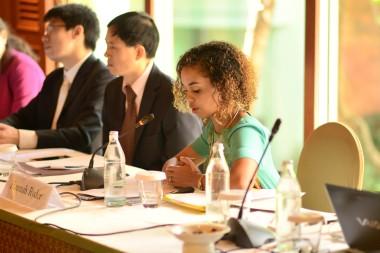
June is always a busy month for my family, as three of us have a birthday in the space of two weeks. Father’s day also takes place in June, and it’s also my husband and my wedding anniversary. There is one thing that makes this heavy month of present giving more manageable though – wish lists. Right now, I am under pressure to compile my own list, but there is always a bit of me that feels a bit reluctant at these times. While I often feel that I’m imposing my own preferences on everyone else, it’s a better outcome for the rest of my family if I just ask directly.
A new report that we’ve just issued at UNDP China and launched at a conference organized by the Asia Foundation says just asking directly is also the best strategy for countries wanting to get better data and information about Chinese aid.
In the academic community, there is a lot of discussion and conjecture about China’s foreign aid. The most authoritative report about China’s aid is from the government – its 2014 White Paper – put the scale of China’s aid at $14.4bn over 3 years. That paper also said that 51% of this is allocated to African countries, but it did not break down the data any further than that. So it is currently very difficult – if not impossible - to really understand accurately which specific countries China prioritizes in terms of giving foreign aid.
At UNDP China, our assessment is that this lack of data is not because such information is secret or sensitive, but because it is simply very difficult to collect. Like my family with presents, the search time is simply too long and complex.
But, as our new study reveals, it turns out there is another way of collecting the data. And it involves African and other country governments just being proactive and asking directly for the data. Over the past few years, 11 country governments – from Congo to Cambodia – have already done so. They have literally just asked the Economic Counsellor in their country to help them include Chinese data in their aid data records (which are often known as AIMSin the development world). In some cases, the governments also asked UNDP country offices to help make these connections in the country and help actively with the data - kind of like using amazon to make the birthday list. But the basic point is this – they just asked.
The great news is that in our 11 cases, the Economic Counsellor – when asked – said “yes we can”. In some cases, gathering the data into the records has taken several iterations, and in others the data requires even more work to get accurate (it is often smaller than media reports, for example). But the fact that the “just asking” strategy has worked for these 11 countries is significant. More countries could follow suit, which would help them better plan for their budgeting priorities in particular, because they fully understand the flows from China and many other countries.
Indeed, there is the potential for the Chinese government itself to use this “just ask” strategy to, in time, build a complete picture of its foreign aid, from the bottom up, in country, where there is the best information about what is really happening. This could be a better outcome for the countries receiving China’s foreign aid, and also a better outcome for China. Government officials in Beijing could compile this sort of information into a more comprehensive report on China’s foreign aid – perhaps a white paper or a regular annual report. Of course, UNDP China would always be ready to help the government do so.
In addition, for countries that are interested in working with China to “just ask” for more data, one great prompt could be a new monitoring survey by the Global Partnership for Effective Development Cooperation (GPEDC), which will begin in October 2015 and finish in February 2016. The results of the survey will feed into a meeting of the GPEDC in Kenya later in 2016. The time really is now for countries to work with the Chinese government on this.